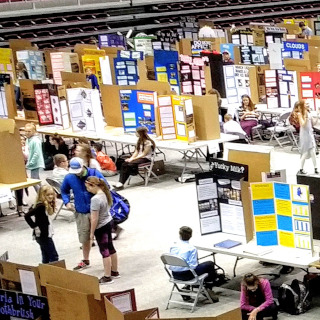Judging Criteria
Typical Judging Criteria Used at the Montana Science Fair.
Science Fair Judging Score Sheet - Printable
Creative Ability (Individual-30; Team-25)
Does the project show creative ability and originality in:
- the question asked?
- the approach to solving the problem?
- the analysis of the data?
- the interpretation of the data?
- the use of equipment?
- the construction or design of new equipment?
Scientific Thought/Engineering Goals (Individual-30; Team-25)
Scientific Thought:
Is the problem stated clearly and unambiguously? Was the problem sufficiently limited so that it was possible to attack it? Was there a procedural plan for obtaining a solution? Are the variables clearly recognized and defined? If controls were necessary, was there a recognition of their need, and were they correctly used? Are there adequate data to support the conclusions? Are the limitations of the data recognized? Does the student understand how the project ties in with related research? Does the student have an idea of what further research is indicated? Did the student cite scientific literature, or cite only popular literature (local newspaper, Reader's Digest, etc.?)
Engineering Goals:
Does the project have a clear objective? Does this objective have relevance to the needs of the potential user? Is the solution workable, acceptable to the potential user, and economically feasible? Can the solution be successfully utilized in the design or construction of some end product? Does the solution represent a significant improvement over previous alternatives? Has the solution been tested to see if it will perform under the conditions of use? (This may be difficult for many students, but it should at least be considered.)
Thoroughness (Individual-15; Team-12)
Does the project carry out its purpose to completion within the scope of the original aims? How completely has the problem been covered in the project? Are the conclusions based on a single experiment, or on replication? If it is the kind of project where notes were appropriate, how complete are they? Is the student aware of other approaches or theories concerning the project? How much time was spent on the project? Is the student familiar with the scientific literature in the field in which he/she was working? Note: citations are not considered to be an important consideration in engineering (as opposed to science) and so a student should not be penalized for a lack of citations.
Skill (Individual-15; Team-12)
Does the student have laboratory, computation, observational, and design skills required to do all the work necessary to obtain the data which supports the project? Where was the project done? What assistance was received from parents, teachers, scientists, or engineers? Was the project carried out under the supervision of an adult, or did the student work largely on his/her own? Where did the equipment come from? Was it built independently by a student? Was it obtained on loan? Was it part of a laboratory in which the student worked?
Clarity (Individual-10; Team-10)
How clearly is the student able to discuss the project? Is he/she able to explain its purpose, procedure, and conclusions in a clear and concise manner? Has the written material been expressed well by the student? Are the important phases of the project presented in an orderly manner? How clearly are the data and the results presented? How well does the project display explain itself? Is the presentation done in a forthright manner, without cute tricks or gadgets? Did the student/team perform all the project work, or did someone help?
Teamwork (Team Projects only-16)
Are the tasks and contributions of each team member clearly outlined? Was each team member fully involved with the project, and is each member familiar with all aspects? Does the final work reflect the coordinated efforts of all team members?
ISEF Grand Award Judging Criteria
For more information on the ISEF Grand Award Judging Criteria visit https://www.societyforscience.org/isef/judging/grand-award/criteria/.
